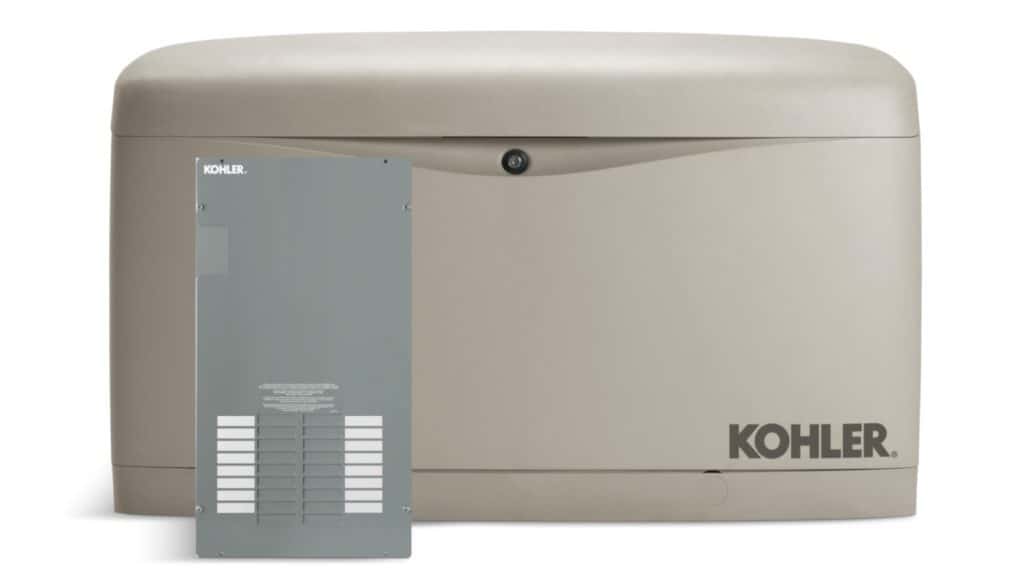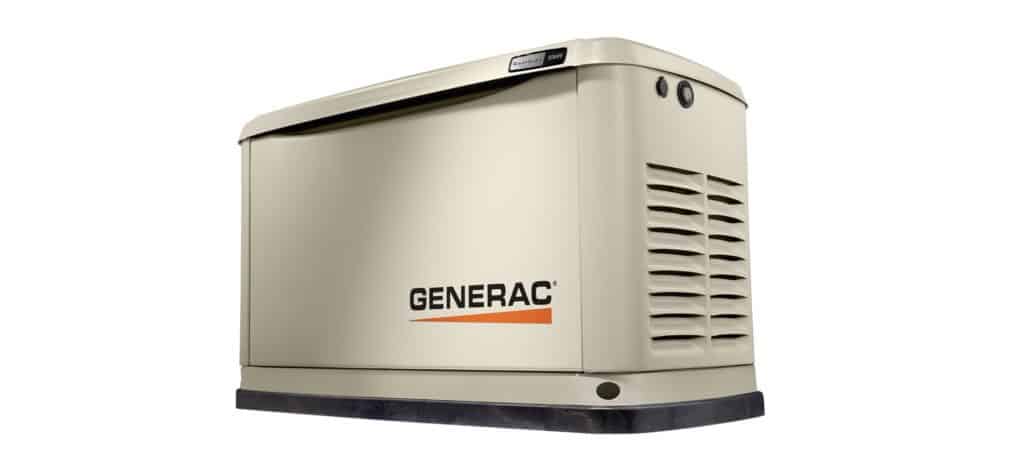If you are thinking about purchasing a whole house generator, there are a lot of factors to consider. Doing some research ahead of the purchase is a worthwhile use of a time. This article will walk through some of what I learned when making the decision.
What Is A Whole House Generator?
A whole house generator is an appliance that is installed near your home which can power the home when your electric cuts out. It’s basically a big engine that converts fuel — for example propane — into electricity. This power is sent to a switch and then to your home’s electrical box, just like as it if was from the power grid. The switch detects when your power from the grid is out, turns the generator on, and switches the electricity from the grid to the generator.
Whole house generators are a safe, reliable way to make sure your home has power through blizzards, hurricanes, wind storms that down trees, and any other power interruptions that you might expect in your area.
A whole house generator means that your electric or hot water heat can stay on in the winter and you don’t need to worry about frozen pipes. It also means that you never lose a full chest freezer full of food because your neighbor decided to drop a tree too close to a power line.
What About A Portable Generator?
A large portable generator will have enough power output to power a whole home, but it’s not considered a “whole house generator.”
Portable generators and portable inverter generators have an open-frame design and aren’t meant to be kept outside when not in use. They don’t have a housing like a whole house unit and they aren’t permanently installed with your home’s electrical system, so they don’t switch on automatically when your power goes out.
Whole House Generator Installation
A whole house generator needs to be installed by a professional. This is because you don’t just plug your laptop and TV into it, but rather it is a large, permanent device (about 3 feet by 2 feet by 2 feet) that connects to a fuel supply and also connects to your home’s electrical box.
It has to be installed by a professional electrician and hooked up by a plumber or someone else who is comfortable routing fuel lines.
A generator like this is normally placed on some kind of permanent platform as well, like a small patio or concrete stand. This keeps it out of any standing water, away from any mud, and prevents shifting due to tree roots, ice, and other natural occurrences.
Fuel Type
Like all emergency-style and portable generators, a whole house generator requires a supply of fuel near by. The requirement for a large amount of stable, energy dense fuel means some sort of petroleum-based fuel is the the norm. Most whole house generators run off of:
- propane
- natural gas
- gasoline
- diesel
This will vary based on your home and location.
Features To Watch For
Generators, like all other appliances, have gotten much more technical over the years. This means you’ll want to look for all the normal features of a good generator, but also watch out for connected features that might make the generator smarter or inform you of any happenings with it.
Features to look out for in a whole house generator:
- Self-test mode
- Quiet operation at low RPM
- Connectivity to an app or phone line so you can be aware of any activity
- 5-year (or longer) warranty
- Tough aluminum or plastic enclosure
How Big Should My Generator Be?
Some generators create more power than others. The bigger your home and the more people living there, the more power you will likely need. If you work from home, have a business running from your home, or have special circumstances like that and you will likely need more power.
A 2500 square foot home with central AC, an electric stove, a well pump, and a family of 5 would probably use a 20kW (20,000 watt) generator. If you are happy roughing it then the generator is running — no AC, television, or dishwasher — then you can likely get by with a 14kW or 16kW generator. A smaller generator will be just as costly to install but it’ll be cheaper to buy and it’ll use marginally less fuel.
Most people size up with their generators because it’s easier to spend a few hundred more dollars upfront and then live your life when the power is out instead of worrying about if you can turn on the microwave or not.
The Best Whole House Generators For Homes
In my experience the best whole house generators come from two companies: Kohler and Generac. Now, that’s just one person’s experience and I, of course, haven’t owned dozens of homes or talked to hundreds of neighbors about their generators. That said, in my research and experience these are good brands that make many very good products.
Since you are going to ask, my whole house generator is a Kohler. It’s served my home well for over 5 years.
Generac 7043 22kW Whole Home Backup Generator
A great, and popular pick, these days is the Generator 7043. This is designed for a house of 2500-3500 square feet with a full set of appliances running, as well as mandatory stuff, like a well pump, furnace, and sump pump.
This model has a starting price of $5250, but that’s before fees, shipping, etc. and of course installation is another thing altogether. Prices can also go up if you want to accessorize with the connectivity features and things like that.
Features
- Warranty: 5-year warranty
- Maximum Continuous Power: 22,000W (propane) / 19,500 (natural gas)
- Fuel Compatibility: Natural Gas, Liquid Propane
- Noise Level: 67 db
- Total Harmonic Distortion: <5% (safe for electronics)
- Covering: All-weather Aluminum
- Transfer Switch: 200-amp rated, NEMA 3R, outdoor enclosure, smart switch
- Self-Test Mode: Yes, at low RPM to save fuel and stay extra quiet

Kohler 20kW 20RESCL Home Generator
Another good way to go is the 20RESCL, a 20kW generator from Kohler power systems. This is the newer version of the model I have, so I can confidently recommend it!
This model is also the closest competitor to the Generac above, so it’s a good comparison. The starting retail price is about $5100, so essentially the same as well.
Features
- Warranty: 5-year, 2,000-hour
- Max Continuous Power Rating: 20,000 (propane) / 18,000 (natural gas)
- Fuel Type: Natural Gas, Liquid Propane
- Noise Level: 69 dB
- Total Harmonic Distortion (THD): <5%
- Transfer Switch: RXT
- Remote Monitoring: Included

